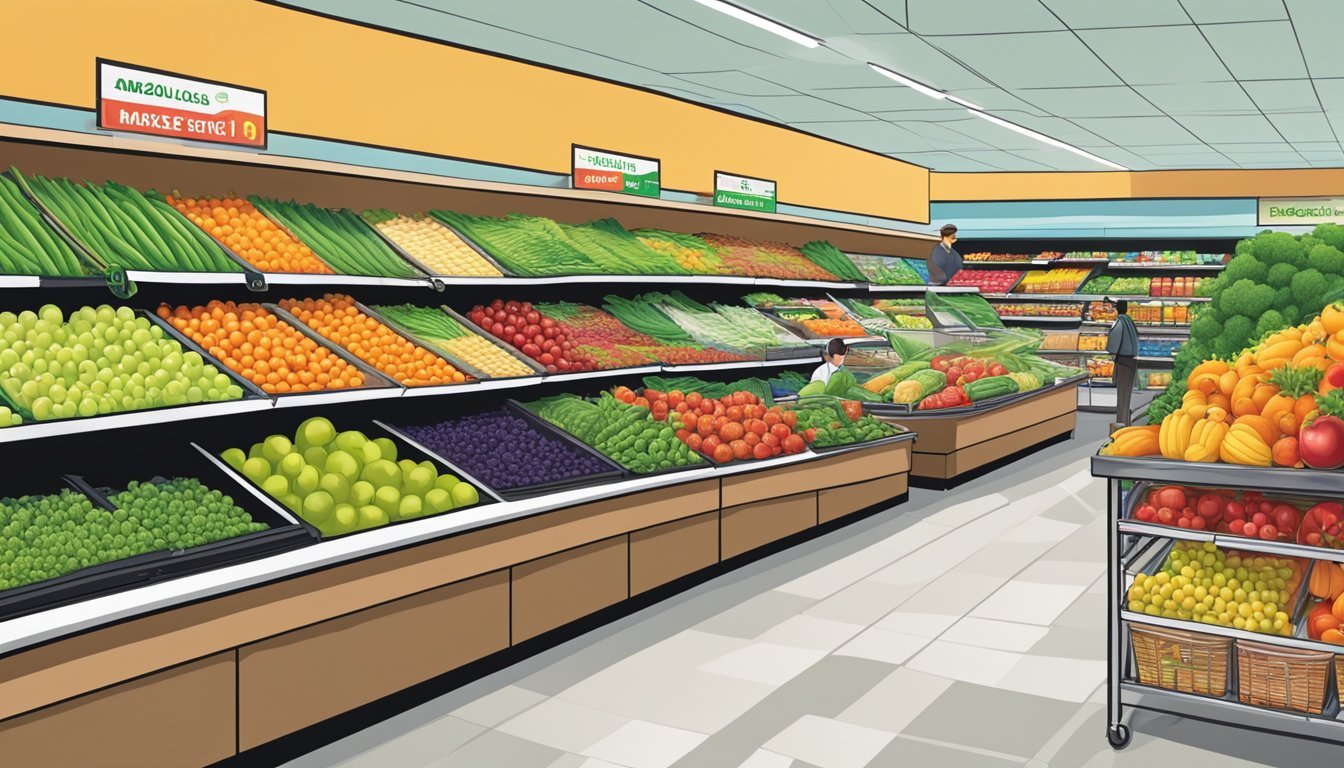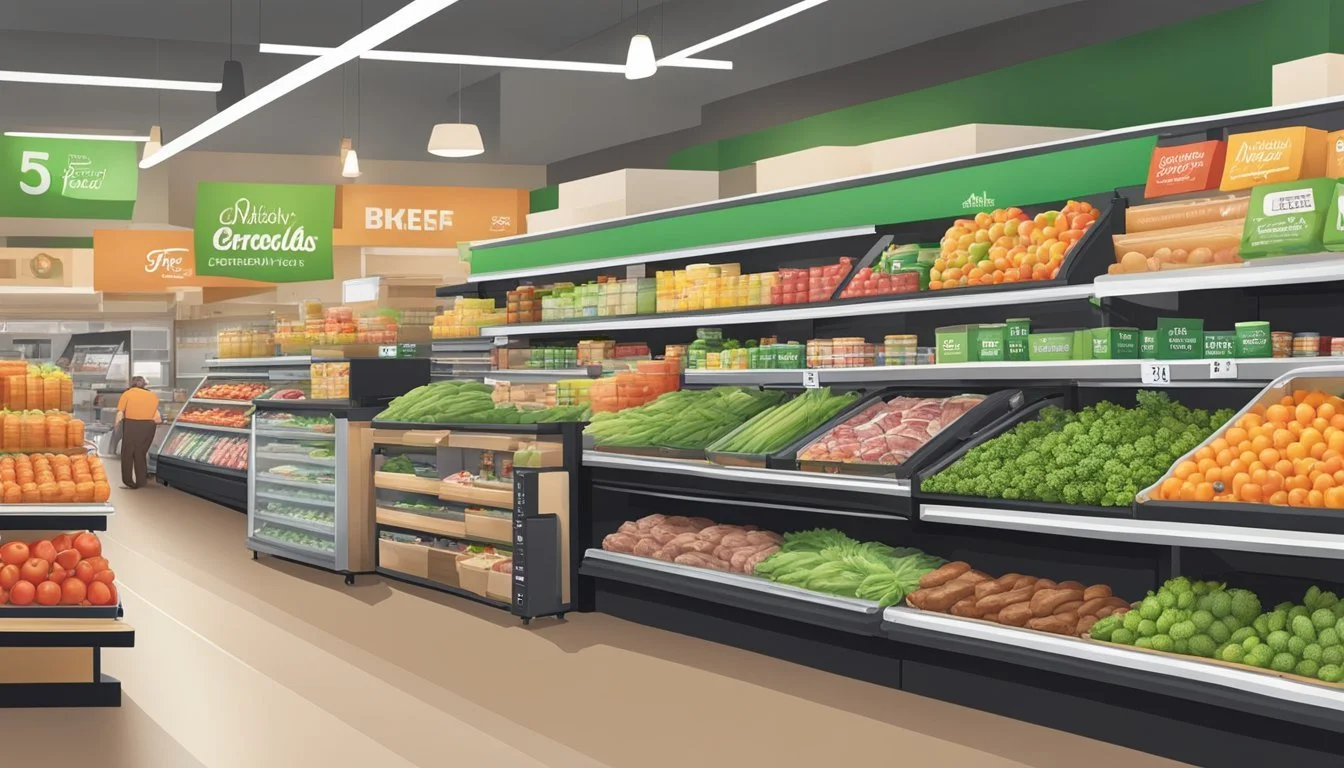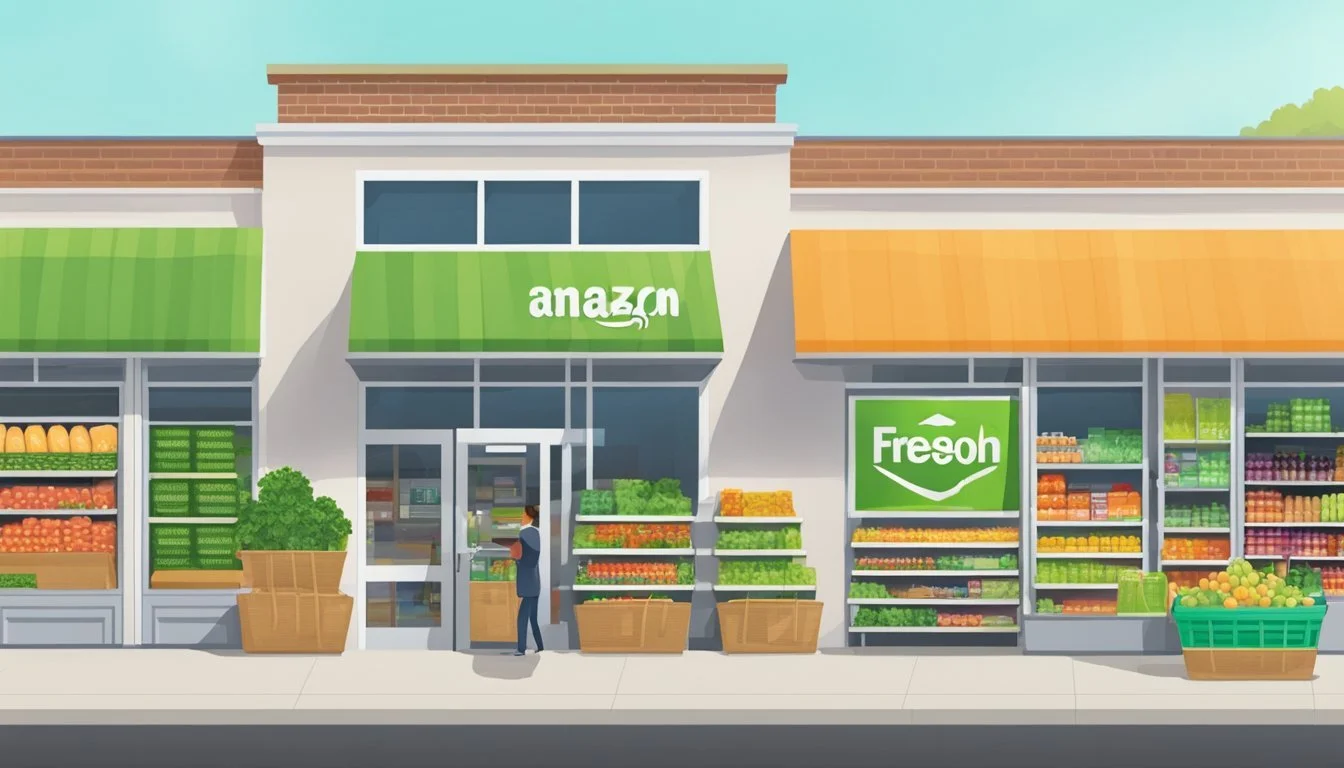Amazon Fresh vs Demoulas Market Basket
A Comprehensive Comparison of Price, Quality, and Convenience
Amazon Fresh and Demoulas Market Basket are two distinct grocery chains vying for shoppers' attention in an increasingly competitive landscape. Amazon Fresh leverages technology and convenience, offering a "just walk out" shopping experience in some locations. Market Basket, on the other hand, maintains a more traditional approach with a focus on low prices and customer loyalty.
While Amazon Fresh excels in innovation and online integration, Market Basket often edges out competitors in affordability and community connection. Both chains have found success in their respective niches, with Amazon Fresh expanding rapidly across multiple states and Market Basket maintaining a strong presence in New England.
Shoppers' preferences between these two stores often depend on their priorities. Those who value cutting-edge technology and seamless online-to-offline experiences may gravitate towards Amazon Fresh. Customers seeking budget-friendly options and a familiar shopping environment might prefer Market Basket. The choice ultimately comes down to individual needs and values in the grocery shopping experience.
Company Overviews
Amazon Fresh and Demoulas Market Basket have distinct histories and business models. Amazon Fresh represents a tech giant's foray into grocery, while Market Basket has deep roots as a family-owned New England chain.
History of Amazon Fresh
Amazon Fresh launched in 2007 as an online grocery delivery service. It expanded to physical stores in 2020, leveraging Amazon's e-commerce expertise. The first Amazon Fresh store opened in Los Angeles, California.
Amazon Fresh stores feature high-tech amenities like smart Dash Carts. These carts automatically track items and allow customers to skip checkout lines. The chain has grown to 29 locations across six states.
In 2017, Amazon acquired Whole Foods Market for $13.7 billion. This move signaled the company's serious intentions in the grocery sector. Amazon Fresh complements Whole Foods by offering more mainstream products at lower price points.
History of Demoulas Market Basket
Demoulas Market Basket traces its origins to 1917. Greek immigrants Athanasios and Efrosini Demoulas opened a small grocery store in Lowell, Massachusetts during the Great Depression.
Their sons, George and Telemachus, took over in 1954 and expanded the business. The chain grew steadily in New England, focusing on low prices and customer satisfaction.
Market Basket became known for its employee-friendly policies. The company implemented a profit-sharing plan that rewarded long-term workers. This approach fostered loyalty and low turnover rates.
In 2014, Market Basket faced a major crisis. A family dispute between Arthur S. Demoulas and Arthur T. Demoulas led to widespread employee protests. Customers boycotted stores in support of ousted CEO Arthur T. Demoulas. He eventually regained control, solidifying the company's reputation for valuing workers and customers alike.
Service Models
Amazon Fresh and Demoulas Market Basket employ distinct approaches to serve customers. Their service models encompass both digital and traditional shopping methods, catering to diverse consumer preferences.
Grocery Delivery and Pickup Services
Amazon Fresh offers extensive online ordering options through its app and website. Customers can schedule same-day delivery or pickup at designated locations. The service integrates seamlessly with Amazon Prime memberships, providing free delivery on orders over a certain threshold.
Market Basket partners with Instacart for delivery and pickup services. This collaboration allows customers to order groceries online for home delivery or curbside pickup at select stores. While not as technologically advanced as Amazon's system, it provides a convenient option for those who prefer Market Basket's products.
Both retailers offer user-friendly interfaces for browsing products, creating shopping lists, and managing orders. Amazon's app includes features like Alexa integration and personalized recommendations based on purchase history.
In-Store Shopping Experience
Market Basket focuses on a traditional in-store shopping model. Stores are known for their wide aisles, well-stocked shelves, and helpful staff. The company emphasizes customer service and a familiar shopping environment.
Amazon Fresh stores incorporate innovative technology like "Just Walk Out" in some locations. This system allows customers to shop without going through a checkout line. Shoppers can simply grab items and leave, with purchases automatically charged to their Amazon account.
Both chains maintain clean, organized stores with clear signage. Market Basket tends to have a more personal feel, while Amazon Fresh offers a more modern, tech-driven experience. Some Amazon Fresh locations also include small convenience store sections for quick purchases.
Product Offerings
Amazon Fresh and Demoulas Market Basket both provide a wide range of grocery items, but their product offerings differ in key areas. Let's compare their selections across several important categories.
Fresh Produce and Perishables
Amazon Fresh emphasizes convenience and quality in its produce section. They offer pre-packaged fruits and vegetables, often sourced from local farms. Their selection includes organic options and pre-cut produce for busy shoppers.
Market Basket is known for its extensive produce department. They prioritize locally sourced fruits and vegetables when possible, offering a wide variety of seasonal items. Their produce is often priced competitively, making it attractive for budget-conscious shoppers.
Both stores stock a range of dairy products, including milk, cheese, and yogurt. Amazon Fresh tends to carry more specialty and plant-based alternatives, while Market Basket focuses on traditional dairy offerings at lower prices.
Meat and Seafood Selection
Amazon Fresh provides a selection of pre-packaged meats and seafood. They offer both conventional and organic options, with a focus on popular cuts and varieties. Their seafood selection includes fresh and frozen options, with some sustainably sourced choices.
Market Basket is known for its full-service meat and seafood counters. They offer a wider variety of cuts and types of meat, often at lower prices than competitors. Their seafood department typically includes a mix of fresh and frozen options, with an emphasis on local catch when available.
Both stores carry poultry, beef, pork, and lamb. Market Basket generally offers a broader selection of less common meats and seafood varieties.
Packaged Foods and Household Supplies
Amazon Fresh stocks a wide range of packaged foods, including national brands and their own private label items. They offer a good selection of specialty and international products, catering to diverse dietary needs and preferences.
Market Basket provides a comprehensive array of packaged foods, focusing on popular brands and their own Market Basket label products. They are known for competitive pricing on staple items and household supplies.
Both stores offer cleaning products, paper goods, and personal care items. Amazon Fresh may have a slight edge in eco-friendly and natural household products, while Market Basket often wins on price for traditional brands.
Amazon Fresh includes more items from Whole Foods Market and the 365 by Whole Foods Market line, offering organic and natural options across categories.
Pricing and Value
Amazon Fresh and Demoulas Market Basket take different approaches to pricing and customer value. Their strategies impact affordability, membership benefits, and overall shopping experience.
Comparison of Prices and Affordability
Amazon Fresh offers competitive prices, often beating traditional grocery stores. Their prices are typically 18-19% lower than average supermarket costs. For a family spending $250 weekly on groceries, this could translate to over $2,300 in annual savings.
Market Basket is renowned for its low prices. The chain focuses on keeping costs down and passing savings to customers. Their prices are also about 18% below the industry average, putting them on par with Amazon Fresh in terms of affordability.
Both stores excel in providing value, but their methods differ. Amazon Fresh leverages technology and efficient supply chains. Market Basket relies on a no-frills approach and longstanding relationships with suppliers.
Membership and Loyalty Programs
Amazon Fresh requires a Prime membership for access. Prime offers additional benefits like free shipping and streaming services. The annual fee may offset some grocery savings for infrequent shoppers.
Market Basket doesn't have a formal membership program. Instead, they focus on consistently low prices for all customers. This approach aligns with their philosophy of treating all shoppers equally.
Amazon Fresh provides digital coupons and personalized deals through the app. Market Basket offers traditional paper coupons and weekly specials advertised in stores and local papers.
Prime members can earn cashback on Amazon Fresh purchases with the Amazon Prime Rewards Visa card. Market Basket doesn't have a store credit card but partners with third-party financial institutions for credit offerings.
Technology and Convenience
Amazon Fresh and Demoulas Market Basket employ different technological approaches to enhance the shopping experience. Their digital platforms and in-store innovations reflect distinct strategies for customer convenience and efficiency.
Digital Shopping Platforms
Amazon Fresh leverages its parent company's e-commerce expertise, offering a robust online and mobile app experience. Customers can browse products, create shopping lists, and place orders for delivery or pickup. The app integrates with Amazon Prime, providing exclusive deals and free delivery options for members.
Market Basket's digital presence is more traditional. Their website offers weekly circulars and basic store information. While they lack a dedicated shopping app, some locations partner with third-party delivery services.
Innovations in Store Technologies
Amazon Fresh stores showcase cutting-edge technology. Select locations feature "Just Walk Out" technology, using AI, cameras, and weight sensors to track items as shoppers move through the store. Customers scan a QR code upon entry and exit without stopping at a checkout.
Market Basket focuses on conventional shopping experiences. They prioritize efficient checkout lines and well-staffed customer service desks. Some stores offer self-checkout options for added convenience.
Both chains continue to adapt their technological offerings to meet evolving customer preferences in the competitive grocery landscape.
Customer Service and Support
Amazon Fresh and Market Basket prioritize customer satisfaction through various delivery options and responsive service. Both strive to address customer concerns promptly and offer flexible shopping experiences.
Delivery Options and Fees
Amazon Fresh provides free delivery for Prime members on orders over $35-$50, depending on location. Non-Prime members pay a delivery fee. Customers can choose delivery windows and track orders in real-time. Tipping drivers is optional but encouraged.
Market Basket offers curbside pickup at select locations. They partner with Instacart for home delivery, which incurs a fee. Delivery windows are available throughout the day. Tipping is also optional for Market Basket deliveries.
Both stores allow customers to modify delivery addresses and provide special instructions for drivers.
Customer Feedback and Service
Amazon Fresh handles customer service through Amazon's established channels. Prime members receive priority support. Refunds are typically processed quickly for missing or damaged items.
Market Basket is known for personalized customer service in stores. They handle online order issues through dedicated support teams. Customers praise their responsive approach to resolving concerns.
Both retailers actively seek customer feedback to improve their services. Amazon Fresh uses automated surveys, while Market Basket relies on direct customer interactions and community engagement.
Geographical Availability
Amazon Fresh and Demoulas Market Basket have distinct geographical footprints. Their delivery services cover different regions, impacting customer access and convenience.
Coverage Areas for Delivery Services
Amazon Fresh operates in select cities across the United States. The service is available in major metropolitan areas like Washington D.C., Seattle, and Los Angeles. Customers can check eligibility by entering their zip code on the Amazon website.
Market Basket, in contrast, focuses primarily on New England. The chain has stores in Massachusetts, New Hampshire, and Maine. Their delivery service is limited to areas surrounding their physical locations.
Amazon Fresh requires a Prime membership, which costs $14.99 per month in addition to the regular Prime fee. This grants access to free delivery on orders over a certain threshold.
Market Basket does not have a membership requirement for delivery. They partner with third-party services in some areas to offer home delivery options.
Corporate Responsibility and Ethics
Market Basket and Amazon Fresh take different approaches to corporate ethics and social responsibility. Their practices impact workers, suppliers, operating costs, and environmental sustainability in distinct ways.
Treatment of Workers and Suppliers
Market Basket offers higher wages and better benefits to employees compared to industry averages. The company provides profit sharing and promotes from within. During a 2014 leadership dispute, workers protested to support ousted CEO Arthur T. Demoulas, demonstrating strong employee loyalty.
Amazon has faced criticism over working conditions in warehouses and delivery operations. The company has made efforts to improve wages and benefits in recent years. Amazon's relationships with suppliers can be challenging due to its market power and demand for low prices.
Operating Costs and Sustainability
Market Basket keeps prices low through efficient operations and limited marketing. The company focuses on no-frills stores and a streamlined product selection. This approach reduces overhead costs.
Amazon Fresh leverages technology and automation to control costs. The company uses data analytics to optimize inventory and logistics. Amazon has made public commitments to reduce its environmental impact, including goals for renewable energy use and sustainable packaging.
Both companies face ongoing challenges in balancing profitability with ethical practices and sustainability initiatives. Their approaches continue to evolve in response to consumer expectations and market pressures.
Pros and Cons
Amazon Fresh and Market Basket offer distinct advantages and drawbacks for shoppers. Each grocery chain has unique features that cater to different customer preferences and needs.
Advantages of Each Grocery Chain
Amazon Fresh excels in convenience with its online ordering and delivery options. Prime members enjoy free delivery on orders over $35. The platform offers a wide selection of items, including Fresh brand and Happy Belly private label products. Amazon Fresh's "just walk out" technology in physical stores eliminates checkout lines.
Market Basket is known for its competitive pricing and value. The chain offers a broad range of products, including local and regional favorites. Many customers appreciate Market Basket's commitment to customer service and community involvement. The stores often feature in-house bakeries and delis, providing fresh prepared foods.
Limitations and Considerations
Amazon Fresh requires a Prime membership, which may not be cost-effective for all shoppers. The service is not available in all areas, limiting access for some consumers. Prices can be higher compared to traditional grocery stores, especially for non-Fresh brand items.
Market Basket has a more limited geographical presence, primarily serving the northeastern United States. The stores can be crowded during peak hours, leading to longer wait times. Market Basket's online presence is less developed compared to Amazon Fresh, with fewer digital shopping options available.
Conclusion
Amazon Fresh and Demoulas Market Basket each offer distinct advantages for grocery shoppers. Amazon Fresh leverages cutting-edge technology to provide a convenient, cashier-less experience. Their "just walk out" stores allow customers to grab items and leave without waiting in checkout lines.
Market Basket, on the other hand, focuses on affordability and value. Their prices are significantly lower than average, potentially saving families thousands of dollars per year on groceries.
Both stores have their strengths in different areas. Amazon Fresh excels in convenience and modern shopping experiences. Market Basket shines with competitive pricing and a focus on traditional grocery offerings.
The choice between these two retailers ultimately depends on individual priorities. Shoppers seeking the latest tech innovations may prefer Amazon Fresh. Those prioritizing budget-friendly options are likely to appreciate Market Basket's low prices.
Neither store can be definitively declared "better" as they cater to different customer needs. Both Amazon Fresh and Market Basket have found success by focusing on their unique strengths in the competitive grocery market.












